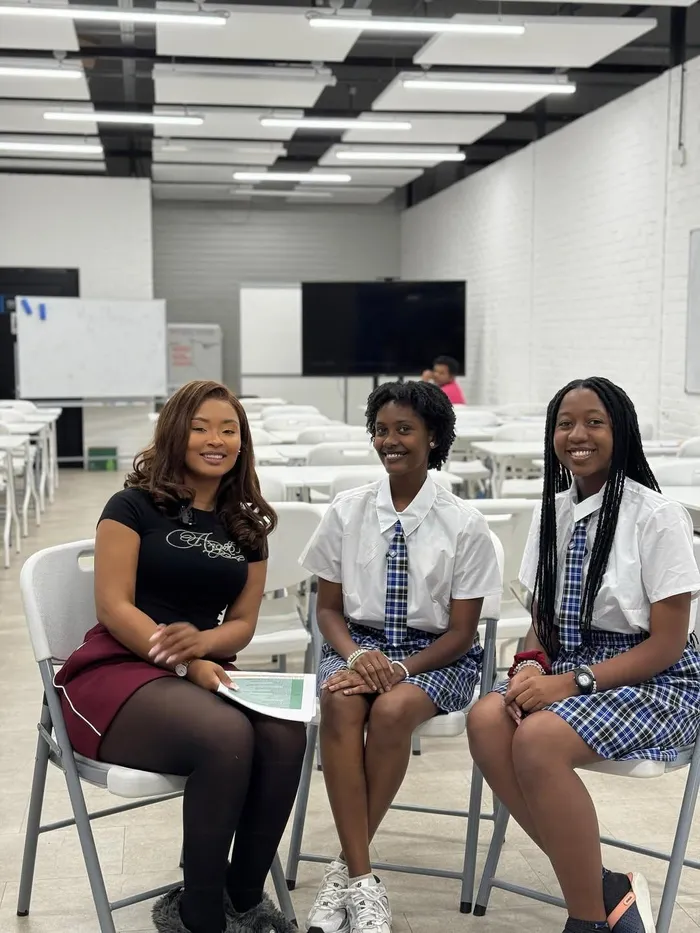
South African social media star and DJ, Cyan Boujee and the two young women, (L-R) Phionah Komuhangi and Melissa Omugabekazi from Uganda who are part of the 'Alabuga Start' programme, she interviewed for them for her video.
Image: Instagram/cyan.boujee24
In July, social media star and DJ Cyan Boujee traveled to Russia for a paid influencer campaign and over the weekend; she shared a video documenting the trip.
The video shows Cyan Boujee, whose real name is Honor Zuma, promoting the Alabuga Start programme. With over 900,000 Instagram followers and significant engagement, Cyan Boujee’s content highlighted aspects of Alabuga’s operations.
According to the Business and Human Rights Resource Centre, in October 2024, The Associated Press reported that women from Africa, largely Central and East African countries, were recruited via social media to work in a factory in Russia assembling drones to be launched in Ukraine.
After public outcry and questions about the Alabuga Start programme, the influencers removed their promotional videos.
In South Africa, many young people are desperate for jobs, and scams use the unemployment crisis to dupe many unsuspecting victims.
CrimeWatch_RSA tweeted that the start program is currently under investigation.
Other South African influencers, including Peachy Sprinkles (Siyamthanda Anita), Ghost Hlubi (Khanya Hlubi), Seemah (Sima Mangolwane), and Zillewizzy (Khathutshelo Netshitomboni), also promoted the Alabuga Start programme.
Around 200 women from Africa are said to have been employed in a factory in Tatarstan’s Alabuga Special Economic Zone, working alongside Russian vocational students (some as young as 15), in the weapons factory.
The women often did not realise they would be making weapons until after arrival; during recruitment, they were told that they would be joining a work-study program in fields such as hospitality.
The report also found that in the factory, the women experienced labour rights violations, including long hours, surveillance, lower wages than those promised to them, difficulties leaving the factory, restrictions on talking to the media or other “outsiders” about their work, and occupation health and safety violations, including working with chemicals that injured their skin.
Clayson Monyela, Head of Public Diplomacy at the Department of International Relations, speaking on Radio 702 with Bongani Bingwa, explained why some of these international opportunities are linked to human trafficking.
Passports are taken upon arrival, one lives in slave like conditions and they are not allowed to have contact with their family and when they do, they are placed under surveillance, essentially losing their freedom.
He shared a story of how one young woman was brought back to the country after finding out that what they were sold was not the reality they arrived at.
Monyela also shared a warning on X, urging young people (girls in particular) not to fall for unverified foreign job offers.
“Some are being promoted by influencers on TikTok, Instagram, and other SM platforms. Human trafficking syndicates are luring people into all sorts of illegal activities under slave-life conditions. If something looks too good to be true, get a 2nd opinion. Contact @DIRCO_ZA or any of our embassies in the country of interest.”
According to the Advertising Regulatory Board’s Social Media Code, adopted in 2019, all social media advertising must not contain any deceptive, false, or misleading content, including deceptive claims, offers, or business practices (by commission or omission).
Clause 4.1 of the Code requires publishers and influencers to disclose any financial benefit or receipt of goods and services in return for media coverage.
IOL
Related Topics: